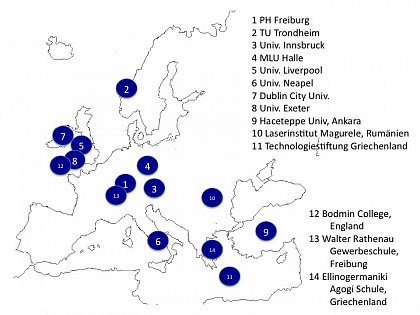INSTEM
INSTEM Partner

Detailed Projectdescription
Responding to global challenges, such as climate change and the need for sustainable development (Europe 2020 target), growth and social cohesion, calls for innovative, scientific solutions based on principles of gender balance, equality and respect for diversity. These challenges require a highly skilled science and technology workforce as well as active, responsible citizenship based on understanding of scientific concepts and interest in sustainable development. Consequently, science education should be made more attractive, for example through enquiry-based teaching, improved guidance and information services for science careers and reducing gender imbalances in science education and careers (see e.g. Rocard 2007).
Enquiry-based teaching and related approaches, such as problem solving or modelling are not new (see e.g. Dewey, 1938, Polya 1945, Burkhardt 1989) and aim to increase pupil interest in mathematics and science, and facilitate lifelong learning and the development of basic and key-competences for future professional life, such as reasoning, representation, problem solving, application and critical reflection. These also form the basis of the PISA key-competences.
However, despite PISA and the resulting political efforts, enquiry-based teaching has not yet been widely implemented in Europe. In the European Union, on average, the percentage of graduates in science and technology is steadily declining, from 24.8 % in 2000 to 22 % in 2009 (Eurydice, 2011b,). Career aspirations are also affected by gender issues, with girls being less interested in science careers and having a lower self-concept of their scientific competences, which in turn affects their performance and engagement (Eurydice, 2011a, 2011b). The report “Evolution of Student Interest in Science and Technology Studies” (2006) notes that traditional methods can impact negatively on attitudes towards learning science.
Thus, in order to respond to global challenges, there is a need to promote educational innovation in the following three areas:
- Implementing enquiry-based teaching
- Raising student interest in science careers
- Reducing gender imbalances in science education
Promoting educational innovation in science education is currently a challenge for most European countries. Although action has been taken across the EU in the above areas, there are still barriers to innovative teaching methods, such as teachers’ reluctance to change established teaching practices, or contextual factors, such as overloaded curricula, or rigid assessment systems. Thus, implementation may take several years, and requires the active collaboration of key-actors such as teachers, schools, teacher education providers, school authorities and policy makers, to ensure systemic change.
The Rocard Report (2007) prompted the European Commission to support the dissemination of enquiry based teaching methods with funds of €60m. Many institutions have conducted successful projects across Europe. However, so far, there are few channels for knowledge sharing across projects, thus reducing their overall impact. Passive repositories are useful but insufficient for continuing dissemination, since active negotiation is required in order to persuade actors to adopt innovative methods or training programs. There is thus a need for sustainable structures, which actively synthesise the knowledge from a wide range of projects into a coherent whole, whilst actively helping to embed innovative methods into the practices of actors. INSTEM is a step towards developing such structures.
The partners in the INSTEM project all have extensive experience of EU projects in relation to science education and the project idea is based on this experience and some informal meetings of partners within ProCoNet. Partners recognise that the effectiveness of their individual projects is limited by the size of their own networks and the fact that changes in education need time, and therefore propose INSTEM, a Comenius Network with the overall goal of maximum valorisation of project results and of developing a sustainable strategy for the implementation of enquiry-based STEM education. Partners of INSTEM share the common aim of improving Science education across Europe and INSTEM is key to this aim.
To maximise the European added value of this investment, INSTEM links key players in these projects in order to cooperate in promoting innovation and best practice and to jointly reflect on how to overcome obstacles. INSTEM is a network of networks which links 32 Comenius projects, networks and FP 7 projects (as partners and associated partners) and allows to disseminate their results not only in their own networks but in this meta-network.
INSTEM will thus effectively – for the first time – synthesize experiences from the Lifelong Learning Programme and the 7th Framework Programme FP7 (Science in Society), which will lead to impressive synergies. It will actively initiate national working groups of stakeholders (prospective members of working groups have already agreed on contributing to this work, see list of associated partners), which will promote dissemination and exploitation of the synthesized knowledge. The national working groups will be linked trans-nationally through a variety of communication tools and activities. INSTEM is thus unique and innovative.
INSTEM will complement platforms like Scientix, SEEP and SEED as it not only lists projects descriptively, but structures and synthesises the findings from multiple projects and actively initiates working groups. It will also promote the use of existing platforms through national work groups and by encouraging associated partners to provide their project materials to these platforms (for further dissemination).
INSTEM will thus lead to the wider dissemination and more sustainable implementation of innovations and best practice models in enquiry-based teaching all over Europe by setting up sustainable national and European networks.



